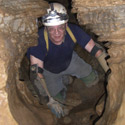Bella Vista is home to many unique things, but none more unique and rare than the cave crayfish.
Cambarus aculabrum is a small, albino crayfish found in only two caves in the known world, one being the village’s Bear Hollow Cave. The rare troglobites were identified at the cave in 1987 by Horton Hobbs, III, the nation’s leading expert on cave crayfish from Wittenberg University in Ohio and Arthur Brown, a biology professor at the University of Arkansas.
Bear Hollow Cave is located off Derwent Road and covers eight acres with around 2,000 feet of passage. The cave is owned by the Nature Conservancy, a national not-for-profit organization dedicated to improving the environment and the organisms that inhabit it. The conservancy’s Ozark Highlands Office is located in Fayetteville, where Tim Snell directs the Ozark Conservation Programs, studying the karst, or cave, systems of the Ozarks.
Snell explained that the cave was donated to the group by the Cooper family in 1998, and John Cooper III currently sits on the conservancy’s board of trustees. The NC has worked with the Property Owners Association to improve the habitat of the rare crayfish, classified as an endangered species by the federal government in 1993. "The Nature Conservancy is partnering with the POA and individual land owners to keep the groundwater clean in Bella Vista for the benefit of the people and the animals," Snell said.
Full Story
http://www.nwanews.com/bvwv/News/1505/
Arkansas cave home to rare troglobite
Moderator: Moderators
2 posts
• Page 1 of 1
-

Wayne Harrison - NSS Hall Of Fame Poster
- Posts: 2382
- Joined: Aug 30, 2005 5:29 pm
- Location: Pine, Colorado
- NSS #: 18689 FE
- Primary Grotto Affiliation: unaffiliated
Here is a link to a recent article in The Southwestern Naturalist by G.O. Graening et al. It extends the range of canbarus acculabrum to 4 sites globally. 3 of the sites are in Benton County, Arkansas and the other site is in Washington County, Arkansas.
http://nabn.info/NewPubsJan2007/graening1.pdf
http://nabn.info/NewPubsJan2007/graening1.pdf
JAG
"I think we need more data..."
"I think we need more data..."
-

gillip - Frequent Poster
- Posts: 81
- Joined: Apr 8, 2007 8:38 pm
- Location: Little Rock, Arkansas
2 posts
• Page 1 of 1
Who is online
Users browsing this forum: No registered users

